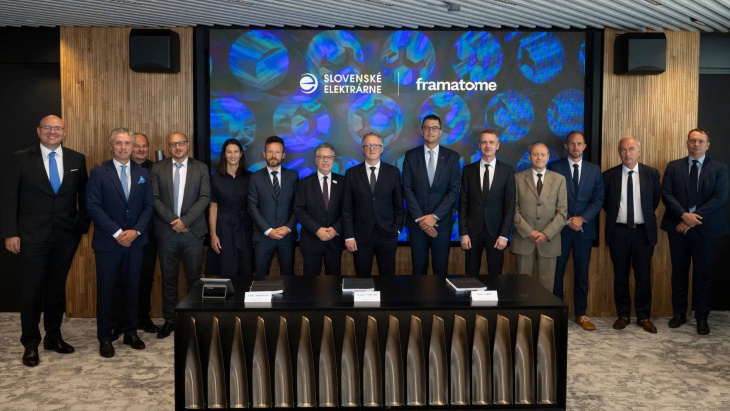Slovak utility Slovenské elektrárne has signed a contract with France's Framatome for the long-term supply of nuclear fuel to the VVER-440 reactors at its Bohunice and Mochovce plants, starting from 2027.

The signing of the fuel supply contract (Image: Slovenské elektrárne)
The signing of the contract followed a memorandum of understanding that was signed by the two companies in May 2023 during a visit and meeting between French President Emmanuel Macron and Slovakia's President Zuzana Čaputová. The MoU sets the basis for future strategy and further discussion of extending the two companies' links in areas including nuclear operations and maintenance, safety instrumentation and control and cybersecurity, as well as examining the feasibility of nuclear medicine and radioisotope production in Slovakia.
"This contract marks a new milestone in the longstanding and fruitful cooperation between Framatome and Slovenské elektrárne," said Lionel Gaiffe, senior executive vice president, Fuel Business Unit at Framatome. "We are pleased to contribute to the diversification of Slovakia's fuel supply and to the safe, reliable and uninterrupted operation of the Bohunice and Mochovce nuclear power plants."
"Securing a contract with one of the world's leading nuclear fuel suppliers for our power plants is an important step in strengthening Slovakia's energy security," said Slovenské elektrárne General Director Branislav Strýček. "Our nuclear power plants represent an important pillar in our country's energy mix, therefore I consider it to be crucial to secure nuclear fuel supply diversification for their stable operation."
Slovakia currently has five nuclear reactors - three at Mochovce and two at Bohunice - generating half of its electricity, and has one more unit at Mochovce under construction. Both plants are operated by Slovenské elektrárne.
The company's diversification strategy is to have at least two alternative nuclear fuel suppliers and potential suppliers of materials and services across the nuclear fuel production supply chain.
In August last year, Slovenské elektrárne signed a long-term agreement with Westinghouse for the licensing and supply of VVER-440 fuel assemblies. The fuel will be supplied by Westinghouse Electric Sweden and will need to get licensing approval for use in the reactors in Slovakia. The aim is for the first deliveries to be about a year after its use is approved.
Nineteen VVER reactors - developed during the time of the Soviet Union and historically reliant on Russian fuel supplies - are currently in operation in the EU, including four VVER-1000 reactors in Bulgaria and the Czech Republic, and 15 VVER-440 reactors in the Czech Republic, Finland, Hungary and Slovakia.
In recent years, especially since the war with Ukraine began, nuclear power operators in EU countries who had previously relied on Russian-supplied fuel have sought alternative suppliers. Bulgaria's Kozloduy signed agreements at the end of 2022 and the beginning of 2023 which will see it replacing its Russian supplier with fuel from Framatome and from Westinghouse.
Framatome said it has "a dual-track approach" to supplying fuel to VVER reactors in operation in the European Union. In the short term, it will fabricate fuel identical to the proven design currently used by the reactors. In parallel, Framatome is developing and qualifying European sovereign fuels of its own design for VVER 440 and 1000 reactors.
Last month, Framatome was awarded a EUR10 million (USD10.7 million) contribution from the EU under the Euratom Research and Training Programme for development and deployment of a European fuel solution for VVER reactors. The SAVE (Safe and Alternative VVER European) project for VVER-440 fuel led by Framatome brings together 17 stakeholders, including utilities operating VVER reactors in the EU.
The project follows the Westinghouse-led Accelerated Program for Implementation of Secure VVER Fuel Supply (APIS) project launched in July 2023 to develop safe fuel designs for VVER-440 and next generation fuel designs for VVER-1000 reactors.
Researched and written by World Nuclear News